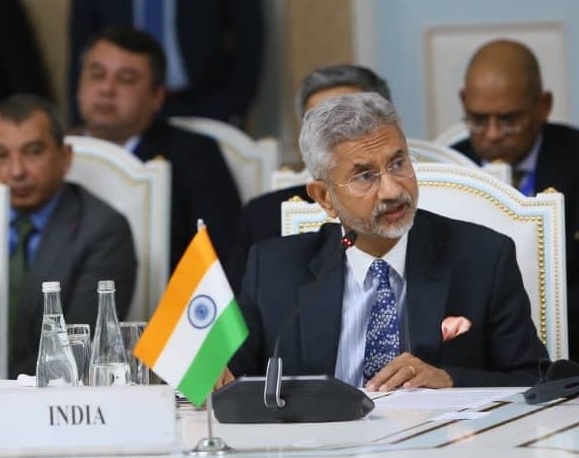India today said that it remained committed to accelerate an intra-Afghan dialogue and proposed a three-point plan to reverse the tide of violence gripping the strife-torn nation, which would open the door for constructive talks.
Speaking at the 9th Ministerial Conference of Heart of Asia–Istanbul Process (HoA-IP) on Afghanistan in Dushanbe, External Affairs Minister S. Jaishankar said that promises aside, violence and bloodshed are daily realities and the conflict itself has shown little sign of abatement.
He pointed out that 2020 marked a 45 percent increase in civilian casualties in Afghanistan over 2019 and 2021 does not look much better as the last few months have witnessed an escalation in targeted killings of civil society. Jaishankar said that the continued involvement of foreign fighters in Afghanistan was "particularly disturbing" and the Heart of Asia members and supporting countries should make it a priority to press for an immediate reduction in violence leading to a permanent and comprehensive ceasefire.
"If the peace process is to be successful, then it is necessary to ensure that the negotiating parties continue to engage in good faith, with a serious commitment towards reaching a political solution," said Jaishankar.
Insisting that a stable, sovereign and peaceful Afghanistan is truly the basis for peace and progress in the region, the External Affairs minister proposed a three-point plan.
First, Jaishankar stressed that a double-layered peace initiative was required to ensure that Afghanistan was suitably tracked for progress. Without naming Afghanistan's neighbours, including Pakistan, he pointed out that if peace in Afghanistan is to prevail, then peace around Afghanistan's borders was necessary.
"It requires harmonizing the interests of all, both within and around that country," he said.
Second, he added that if the peace process is to be successful, then it is necessary to ensure that the negotiating parties continue to engage in good faith, "with a serious commitment" towards reaching a political solution.
Finally, Jaishankar asserted that for Afghanistan to overcome decades of conflict, everyone needs to stay true to principles that the Heart of Asia has long embodied. "Collective success may not be easy but the alternative is only collective failure. Ensuring that it is free of terrorism, violent extremism and drug and criminal syndicates is, therefore, a collective imperative," he elaborated.
India had earlier said that it welcomes and supports a regional process to be convened under the aegis of the United Nations as the UN stewardship would help to take into account all relevant UN resolutions and improve the odds for a lasting outcome.
India's development partnership of USD 3 billion with Kabul includes more than 550 Community Development Projects covering all 34 provinces and is aimed at making Afghanistan a self-sustaining nation. "The promise of more drinking water to Kabul is the latest in that list," said Jaishankar.
Jaishankar spotlighted that as the lead country on trade, commerce and investment CBMs under the HoA-IP, India will continue to work on improving Afghanistan’s connectivity with the outside world.
"Projects like the Chabahar Port in Iran and the dedicated Air Freight Corridor between the cities of India and Afghanistan are part of our efforts. I am glad to note the keen interest of our friends from Central Asia to be a part of these initiatives," stated the minister.
Earlier, immediately after the touchdown in Tajikistan capital on Monday, Jaishankar visited the Dushanbe-Chortut Highway Project site. Under the USD 20 million grant announced during the state visit of President of India to Tajikistan in October 2018, India's Border Roads Organisation is undertaking the construction of the 8-lane highway to decongest the city.

Jaishankar then began his Heart of Asia engagements starting with a meeting with Iranian Foreign Minister Mohammad Javad Zarif. In the meeting, the two sides, besides conferring on the latest political situation in Afghanistan and ways for active participation in Afghanistan peace process, also reviewed the latest status of economic-transit collaborations and India's preparedness for expansion of trade with Iran.
"A warm conversation that underlined our convergences. Also discussed our bilateral cooperation, including Chabahar," tweeted Jaishankar.
Both ministers also underlined the necessity for cooperation among regional countries, especially India and Iran, to consolidate peace and stability in Afghanistan.


It was followed with a meeting with Mevlut Cavusoglu, Turkey's Minister of Foreign Affairs.
"Our discussions focused on Afghanistan-related developments and our bilateral relations," tweeted Jaishankar.

Jaishankar wrapped up a busy Monday after meeting Afghanistan President Ashraf Ghani. This exchange of talks is in continuation of the frequent high-level exchanges held between both the countries, including the recent visit of Afghan Foreign Minister, Mohammad Haneef Atmar to New Delhi from March 22-23. India and Afghanistan continue to work together on strengthening the strategic partnership, particularly cooperation in the areas of political, security, trade, economic, capacity development, education, social and cultural relations.

Jaishankar is also expected to meet other dignitaries at the sidelines of the Heart of Asia conference.




















